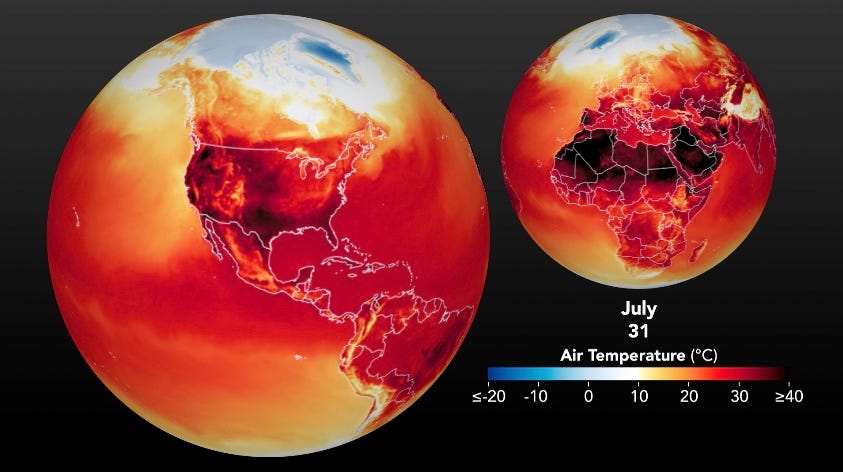COP27 outlook falls as Russia, China shun climate talks with U.S.
Welcome to Callaway Climate Insights. Especially to our new subscribers. Please enjoy, and share with your colleagues.
Today in Callaway Climate Insights:
- China’s suspension of climate talks with the U.S. was inevitable after Pelosi’s Taiwan visit. What’s next?
- How Sen. Joe Manchin threw a wrench into the climate plan’s electric vehicle strategy
- Biden’s climate bill opens vast new areas for off-shore wind development. Here’s where.
- Solar power driving renewable energy to a new record in 2022
A July of extremes: Around the globe in summer 2022, wave after wave of heat crested and broke. Heat waves, particularly in Europe and Asia, caused thousands of heat-related deaths. This heat map model from NASA’s Earth Observatory shows, in the U.S., why pervasive and persistent heat domes put more than 150 million people under heat warnings and advisories in the month of July.
It was inevitable that China’s temper tantrum over Nancy Pelosi’s Taiwan visit would include suspension of climate talks with the U.S. And while it will likely be temporary, coming this close to the United Nations COP27 climate summit in three months means that two out of four of the world’s largest polluters — China and Russia — won’t be at the table with U.S. counterparts.
The suspension of the talks last week — as we noted, one of several strings China will pull to make its displeasure with the Biden Administration known — blows a hole in the diplomatic concept of “compartmentalization” touted by U.S. climate czar John Kerry as a way to place global warming outside of the usual geopolitical negotiations between nations.
It threatens to weaken the buildup to COP27 in Egypt to the point where there is little hope of meaningful progress in Sharm El-Sheikh around issues such as distribution of funds from wealthy polluters to small countries bearing the brunt of global warming. As Kerry rightly pointed out, China’s suspension of talks doesn’t punish the U.S., it punishes the more vulnerable countries.
Russia’s step back from international talks on things like the space station and climate change after its invasion of Ukraine, and China’s provocative acts toward Taiwan, portend a world where climate progress remains in the back seat to territorial disputes and cold war politics. More of a space-race competition than a partnership for the good of the planet.
Despite the progress made by the Biden team in getting the climate bill passed over the weekend, the drawing of lines between East and West that we’ve seen so far in 2022 remains the biggest threat to any progress. Which makes it the obvious first card to play in any dispute, as self-destructive as that is.
More insights below . . . .
Don’t forget to contact me directly if you have suggestions or ideas at dcallaway@callawayclimateinsights.com.
Keep reading with a 7-day free trial
Subscribe to Callaway Climate Insights to keep reading this post and get 7 days of free access to the full post archives.


